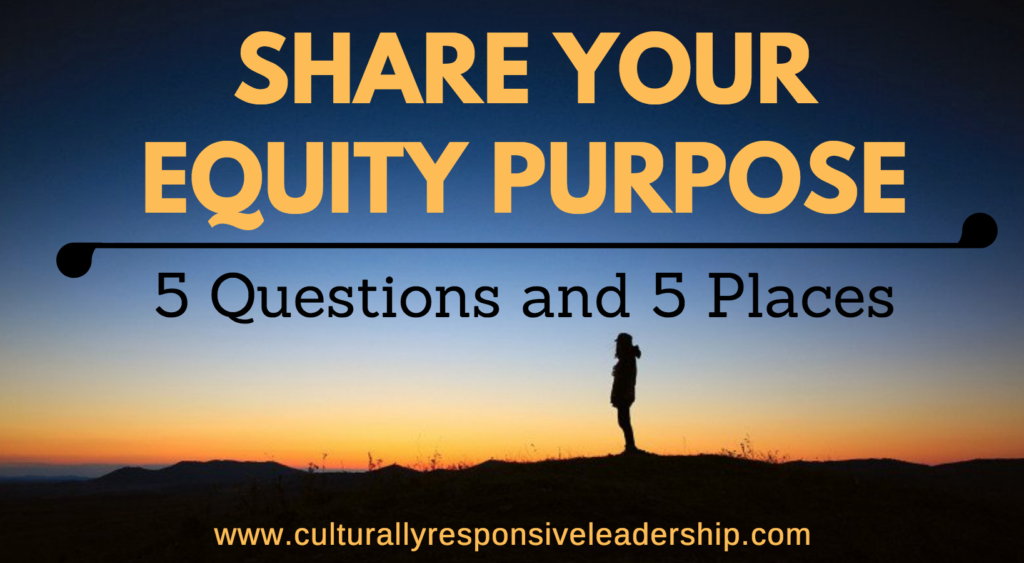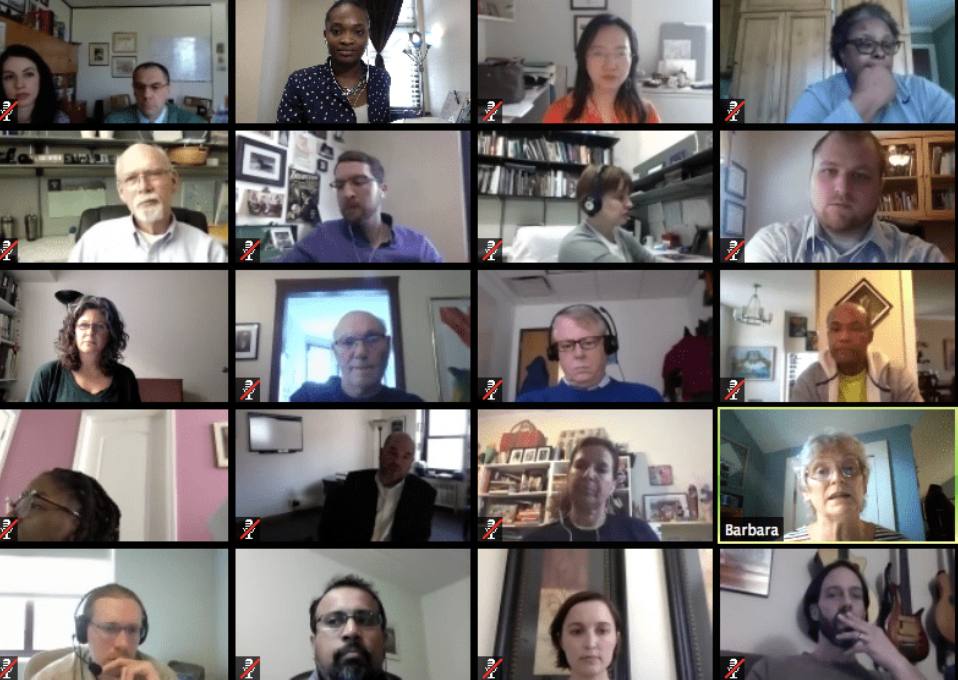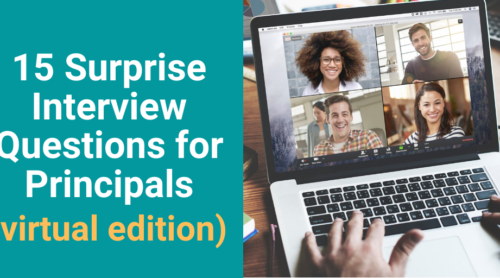15 Surprise Questions to Prepare for Your Principal (Virtual) Interviews
Are you ready for your (virtual) interview? If so, I have 15 questions that might surprise you. You might be freaking out. Luckily, you came to the right place. If you are nervous, good. It’s a big job, and that ring of school keys is quite heavy. Let those nerves inspire you to prepare for one of the biggest interviews of your career so far.
If you are a leader, come to our next Conference and level up!
It’s hiring season, (I know, during a pandemic) which means that some of you are applying for the tremendous job of being a Principal, AP, Supervisor, or Director of something awesome. Hard enough to do this, but interviewing over the internet, makes it hard as hell. I wanted to draft a few ideas of how to prepare and what you questions you might be asked.
I Remember My Principal Interviews
I was pretty nervous for my Principal interviews. I had my handouts and highlighted packet of school data. I did some basic research of schools, looked over their websites and looked for any news reports. Some even have public newsletters. I even hit up a few homies, unofficially, who worked there. All of that gives you a feel for the community.
Shit, I was still sweating.
I wondered: Would they think I was ready? Did they already have an internal candidate? Would I make sense? Enough details? Not too much rambling? Would I be too radical, too black, too young, too political?
Quick story. I interviewed at the school, I attended as a middle schooler. And, one of my teachers was still there and on the panel. Crazy. I was pretty nervous. It was my first Principal interview ever. I think might have even been wearing a godforsaken suit coat (the attire of the establishment). The interview went well but I was destined for another lovely school. (wink, wink)
Its important to prepare yourself: data review, ironing your clothes, public speaking skills, and reviewing some questions. If no one ever told you, you should practice, a lot, not so that you have rehearsed answers, but so that it feels natural. This job is a job of continually communicating your vision, your values, and being vulnerable. Get used to it playa, and tie your game shoes up tight. Also, stand up in front of a mirror and practice. Have a friend, family member, or partner ask you the questions (even if you do it on zoom, since that’s the medium today anyways). A few other tips: be clear, don’t talk for more than 3-5 minutes per question, use examples, and be bold. You are interviewing to be a LEADER.
It goes without saying that there are plenty of standard questions out there, and depending on the politics and vision of your district, you may have plenty or all of those. They might sound like: tell us about yourself, what relevant experience do you have, what’s your approach to discipline, what is your vision for professional development, how might you raise test scores, what are your goals for your first 90 days/first year. blah blah blah. Yes, they are out there and you should practice those too, but I wanted to add a few others to make things interesting.
Here Are 15 Surprise Questions
- What makes you ready to move from being an assistant principal to become a principal? How do we know you are sure?
- How did your teaching experience influence your leadership? What does good teaching look like?
- What do you think our school needs to make the next jump?
- Describe your leadership style.
- How does your racial, gender, and class identity influence your leadership? (Consider attending my next racial equity training for leaders)
- What type of adult learning culture do you want to build? How might you address someone who consistently shows up negatively in staff meetings? (here’s a cheat sheet)
- What is your ideal discipline policy and how might you develop that? How can you help to reduce disproportionality of males of color?
- What did you learn most from your previous Principal? What do you want to implement? What do you want to improve?
- What is your experience with inclusive leadership? Who makes the final call, and how will you know when it’s your call, a team’s, or the whole school’s?
- What is one area where you will need some leadership coaching and support?
- What experience do you have with maximizing school budgets (equity-based budgeting tips here), school site councils, and working with district council members?
- What is your equity imperative in schools? (when to communicate your equity purpose)

- What do you think is missing from schools? (wink wink, culturally responsive teaching and deeper learning)
- Based on the data you know about this school, if we were given $100,000 additional funds, what would you recommend we spend it on? (equity ain’t free).
- How might you deal with an upset parent who is pressuring you to make a decision that supports their child but is against your values and/or takes away from an underserved group of students? (start with some anti-racist mindset work)
You should have good answers to these questions for hiring teachers too!
Types of Interviews
- Typical interview with a supervisor
- School hiring panel (there might be students, staff, and parents)
- Performance Tasks (craft an email response to a crisis, create and present a PowerPoint a analyze school data and propose a PD focus, or watch a video and share how you might give a teacher feedback on their lesson)

But How Do I Prepare for a Virtual Video Interview?
Look, Ima be honest. I hate video interviews. I used to pass on all candidates who couldn’t show up in person, because I was worried they wouldn’t move to an expensive city like SF anyway, and it was hard to get a feel for them through the screen. But those expectations and luxuries are for the birds. So how to prepare? One, work harder to be yourself. It’s easy to get even more professional, refines, and vanilla through a screen. You can see your face (might help to do speaker view), and it makes you obsessed with how your face looks. Let go, move a little bit more. Use some gestures, make it like a conversation.
Have some damn energy. You folks in person are boring, so boring on screen is a snooze fest. So instead, crack a few jokes, smile, or laugh, all that. Do dress up. I know we are all at home in tank tops, flip flops, and sweats, but this is an INTERVIEW. You know you got plenty of clothes that ain’t been pulled out the closet in weeks, maybe months if this is May or June. Feel free to move around in your seat a little. If you are boring, they will be bored and the energy won’t come from them. So bring the energy, be a more loose version of yourself, and be confident.
Know that folks might be tired since zoom meetings are draining, especially all day. Manyu Jiang, writes in their article for BBC,
“Being on a video call requires more focus than a face-to-face chat…we need to work harder to process non-verbal cues like facial expressions, the tone and pitch of the voice, and body language; paying more attention to these consumes a lot of energy.” This means we all need grace, but the interviewee should try to be personable and let your personality show.
Sometimes leader interview panels can be 4-5 hours long. If folks have their screens off, don’t take it personal. It’s not about you, it’s about them. Try to breathe and not be so tense. Look at the camera, or your image.
Don’t use your phone unless that’s all you have, and if so, let them know. Use a device tha is stationary. And have some damned questions. Nothing is worse than getting to the part when a candidate can ask some questions, but they ain’t got none. Can you say anti-climatic? It’s the worse way to end.
Final Words
Listen. If you are considering applying, you are on the right track. This job is not for everyone, and it’s hard as hell. Take it from me. It’s more than fulfilling. You are capable and if you want it, and if you are willing to reflect and grow, you can do this. Believe in yourself.
Practice your answers more times than you think.
A Principal’s main job is communication. Clarity and articulation are paramount and folks want to see if you have it. At least the potential. So practice answering these questions with your friends/family, in the mirror, or record yourself.
One more thing. Tone, body language, and eye contact matter. You have to embody and convey strength, poise, humility and confidence. They have to feel it, so you BETTER feel it.
So make them feel it!
Stay Connected and Updated
More Resources
Thoughts to Consider for the Principal Job from Principal Kafele
52 Practical Interview Questions



